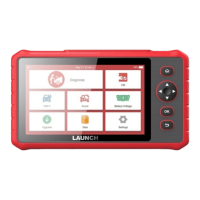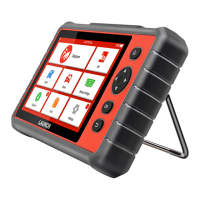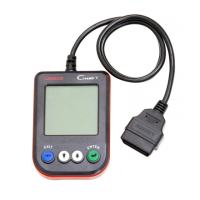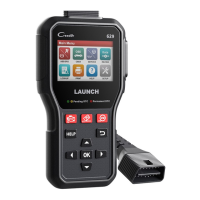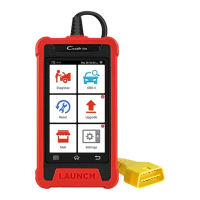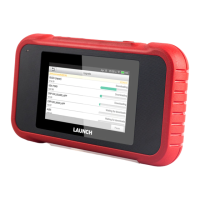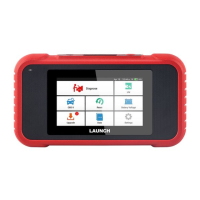12
LAUNCH
Professional 909X User Manual
a Pending Code. The computer does not command the MIL on at this time. If the
fault is sensed again on the second trip, the computer commands the MIL “On,”
and saves the code in its long-term memory.
3. Catalyst Monitor
The catalytic converter is a device that is installed downstream of the exhaust
manifold. It helps to oxidize (burn) the unburned fuel (hydrocarbons) and
partially burned fuel (carbon monoxide) left over from the combustion process.
To accomplish this, heat and catalyst materials inside the converter react with
the exhaust gases to burn the remaining fuel. Some materials inside the catalytic
converter also have the ability to store oxygen, and release it as needed to
oxidize hydrocarbons and carbon monoxide. In the process, it reduces vehicle
emissions by converting the polluting gases into carbon dioxide and water.
The computer checks the efciency of the catalytic converter by monitoring the
oxygen sensors used by the system. One sensor is located before (upstream
of) the converter; the other is located after (downstream of) the converter. If the
catalytic converter loses its ability to store oxygen, the downstream sensor signal
voltage becomes almost the same as the upstream sensor signal. In this case,
the monitor fails the test.
The Catalyst Monitor is supported by “spark ignition” vehicles only. The Catalyst
Monitor is a “Two-Trip” Monitor. If a fault is found on the rst trip, the computer
temporarily saves the fault in its memory as a Pending Code. The computer does
not command the MIL on at this time. If the fault is sensed again on the second
trip, the computer commands the MIL “On” and saves the code in its long-term
memory.
4. Heated Catalyst Monitor
Operation of the “heated” catalytic converter is similar to the catalytic converter.
The main difference is that a heater is added to bring the catalytic converter to
its operating temperature more quickly. This helps reduce emissions by reducing
the converter’s down time when the engine is cold. The Heated Catalyst Monitor
performs the same diagnostic tests as the catalyst Monitor, and also tests the
catalytic converter’s heater for proper operation.
The Heated Catalyst Monitor is supported by “spark ignition” vehicles only. This
Monitor is also a “Two-Trip” Monitor.
5. EGR (Exhaust Gas Recirculation) System Monitor
The Exhaust Gas Recirculation (EGR) system helps reduce the formation
of Oxides of Nitrogen during combustion. Temperatures above 2500°F
cause nitrogen and oxygen to combine and form Oxides of Nitrogen in the
combustion chamber. To reduce the formation of Oxides of Nitrogen, combustion
